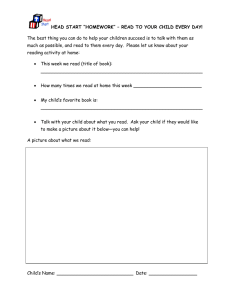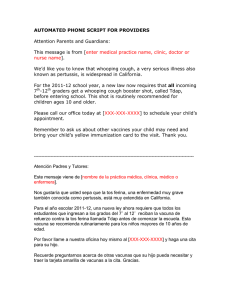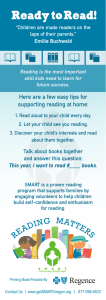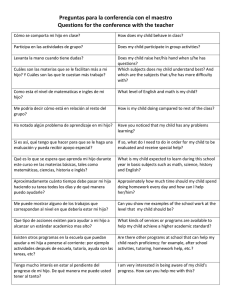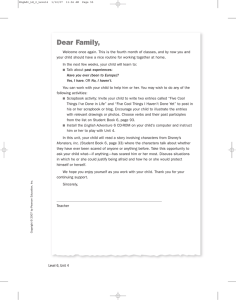Reuniones familiares - The Autism Program of Illinois
Anuncio
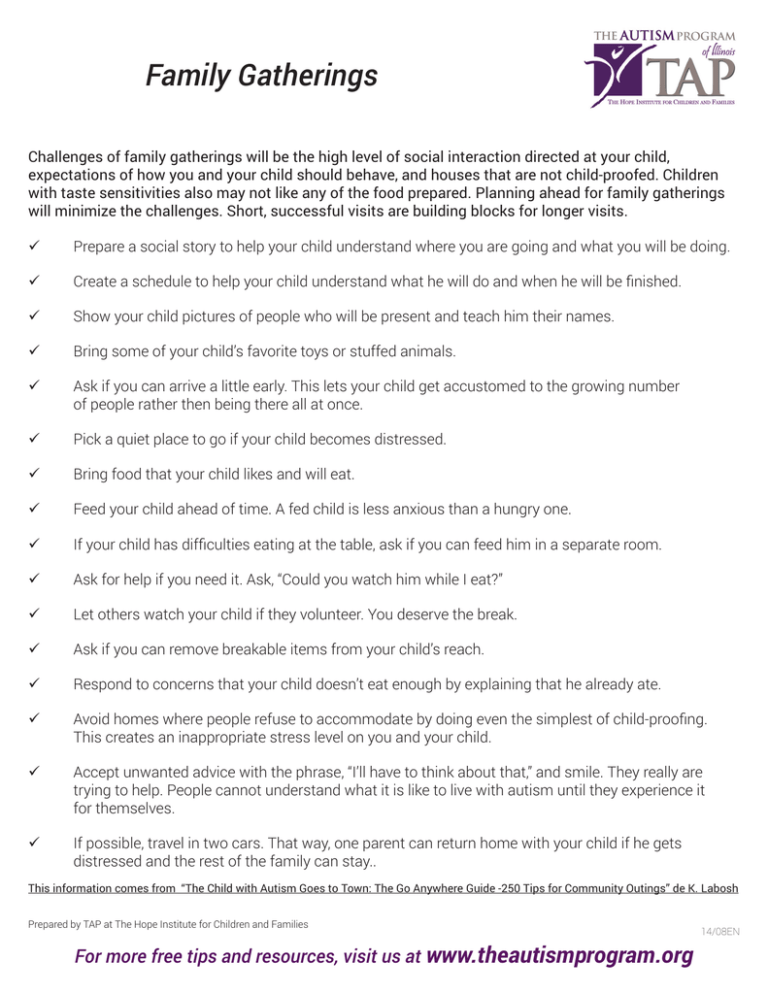
Family Gatherings Challenges of family gatherings will be the high level of social interaction directed at your child, expectations of how you and your child should behave, and houses that are not child-proofed. Children with taste sensitivities also may not like any of the food prepared. Planning ahead for family gatherings will minimize the challenges. Short, successful visits are building blocks for longer visits. Prepare a social story to help your child understand where you are going and what you will be doing. Create a schedule to help your child understand what he will do and when he will be finished. Show your child pictures of people who will be present and teach him their names. Bring some of your child’s favorite toys or stuffed animals. Ask if you can arrive a little early. This lets your child get accustomed to the growing number of people rather then being there all at once. Pick a quiet place to go if your child becomes distressed. Bring food that your child likes and will eat. Feed your child ahead of time. A fed child is less anxious than a hungry one. If your child has difficulties eating at the table, ask if you can feed him in a separate room. Ask for help if you need it. Ask, “Could you watch him while I eat?” Let others watch your child if they volunteer. You deserve the break. Ask if you can remove breakable items from your child’s reach. Respond to concerns that your child doesn’t eat enough by explaining that he already ate. Avoid homes where people refuse to accommodate by doing even the simplest of child-proofing. This creates an inappropriate stress level on you and your child. Accept unwanted advice with the phrase, “I’ll have to think about that,” and smile. They really are trying to help. People cannot understand what it is like to live with autism until they experience it for themselves. If possible, travel in two cars. That way, one parent can return home with your child if he gets distressed and the rest of the family can stay.. This information comes from “The Child with Autism Goes to Town: The Go Anywhere Guide -250 Tips for Community Outings” de K. Labosh Prepared by TAP at The Hope Institute for Children and Families For more free tips and resources, visit us at www.theautismprogram.org 14/08EN REUNIONES FAMILIARES Los retos de las reuniones familiares son el alto nivel de interacción social dirigida a su hijo/a, las expectaciones de su comportamiento y los hogares que no están a prueba de niños. A los niños con sensibilidad a diferentes sabores, puede no gustarles el menú preparado. El planear una visita familiar, puede reducir estos retos. Visitas cortas y exitosas, pueden ser un componente para visitas más largas en el futuro. Prepare una historia social que permita a su hijo/a entender a donde va y lo que hará. Prepare un horario para que su hijo/a entienda lo que hará al final. Muestre a su hijo/a fotos y enséñele los nombres de las personas que estarán presentes Traiga los juguetes favoritos de su hijo/a. Pida llegar antes que los demás. Esto ayudara a que su hijo/a se acostumbre al creciente número de personas en lugar de verlos a todos a la vez. Seleccione un lugar silencioso en caso de que su hijo/a se sienta ansioso/a. Traiga comida que su hijo/a pueda consumir. Alimente a su hijo/a antes de salir. Un niño alimentado se comporta mejor que uno con hambre. Si su hijo/a tiene problemas para comer en la mesa, averigüe si puede alimentarlo en otro cuarto. Pida ayuda si lo necesita. Pregunte ¿Puede cuidar a mi niño/a mientras cómo? Permita a otros que cuiden de su niño/a si se ofrecen…Esto le servirá de descanso. Pregunte si puede retirar artículos frágiles del alcance de su hijo/a. Responda a comentarios sobre lo poco que come su hijo/a explicando que había comido antes. Evite casas donde los dueños se reúsen a adaptar el entorno a prueba de niños. Esto puede crear niveles de estrés inadecuados para usted y su hijo/a. Acepte consejos no solicitados con la frase: “Tendré que pensar en eso” luego sonría. La gente solo trata de ayudarle y no entiende lo que es vivir con autismo hasta que lo experimentan ellos mismos Si le es posible, viaje en dos automóviles. Así uno de los dos padres podrá regresar con su hijo/a si demuestra ansiedad y el resto de la familia se puede quedar. Informacion obtenida de: “The Child with Autism Goes to Town: The Go Anywhere Guide -250 Tips for Community Outings” de K. Labosh Consejos preparados por TAP y el Instituto Hope para Niños y Familias 14/08SP Para mas consejos y recursos gratuitos visite www.theautismprogram.org
